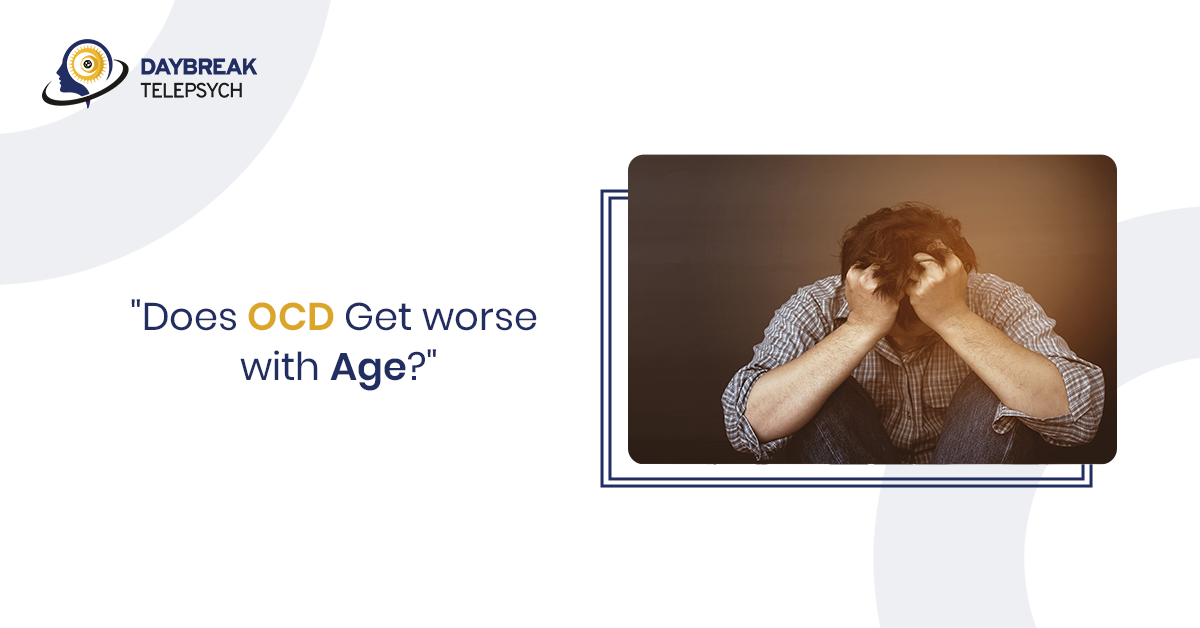Obsessive-Compulsive Disorder (OCD) is a mental health challenge that grips tightly. It traps people in unwanted, obsessive thoughts. It binds them in compulsive, repetitive actions. Many ponder the question, “Does OCD Get Worse with Age?” Understanding how OCD evolves over time is vital. This knowledge empowers better symptom management and enhances overall quality of life. We will explore whether OCD worsens with age. We’ll uncover its causes and find ways to tame it.
Struggling with OCD symptoms? Daybreak Telepsych Services provides caring support to help you manage and take charge. Contact us today.
Can You Get OCD Later in Life?
OCD usually appears in childhood, but can you get OCD later in life? Most cases start early, yet adults can experience OCD as well. Stress, trauma, or big life changes can trigger it unexpectedly. If not treated, OCD may worsen and complicate everyday life.
Does OCD Get Worse with Age?
OCD can be stable for some people. For others, it worsens with age. Stress, major life events, and a lack of proper treatment can contribute to this. Untreated OCD often leads to stronger compulsions and obsessions.
Some reasons why OCD might get worse include:
- More stress – When life gets stressful, OCD symptoms may increase.
- No treatment – Without proper therapy or medication, OCD may become harder to manage.
- Other mental health problems – Anxiety or depression can make OCD worse.
- Substance use – Things like alcohol can increase OCD symptoms.
Can OCD Cause Panic Attacks?
People with OCD can also suffer from panic episodes. When obsessive thoughts become too much, panic can set in. This can lead to:
- A fast heartbeat
- Shortness of breath
- Dizziness
- Sweating or shaking
When OCD and panic attacks coincide, life can be tough. But there’s hope! Therapy and relaxation methods can really help. They allow you to manage symptoms and find peace in the chaos.
Does Alcohol Make OCD Worse?
Many people drink to ease their stress. But does it actually worsen OCD? The answer is a clear yes. Alcohol may provide brief relief. But it increases anxiety and worsens OCD. Relying on this can wear you out. It makes handling OCD challenges even harder.
Exercise and OCD: Can It Help?
A prime strategy for dealing with OCD is through physical activity. Exercise and OCD management go together because exercise:
- Lowers stress
- Boosts mood
- Helps with relaxation
Walking, yoga, and swimming soothe the mind. They quiet obsessive thoughts and create a cocoon of peace.
OCD and Exhaustion: Why Does It Happen?
OCD and exhaustion often go hand in hand. Constant worrying and performing compulsions can be very tiring. Many people with OCD feel exhausted because:
- They don’t sleep well – Worrying and rituals can interfere with sleep.
- Their minds are always working – Fighting off obsessive thoughts takes a lot of energy.
- They feel stressed – Anxiety can drain a person’s energy quickly.
Relaxation techniques, therapy, and healthy habits can help reduce exhaustion caused by OCD.
Can OCD Go Away with Age?
A common question people ask is, “Can OCD go away with age?” Unfortunately, OCD does not just disappear. However, with proper treatment, symptoms can become much more manageable. CBT and medication can help control OCD. They can improve people’s lives.
Life Is Getting Worse: How to Cope with OCD?
Sometimes, OCD can make it feel like life is getting worse. But there are many ways to cope. Here are some helpful steps:
- Seek Therapy: Chatting with a professional unveils new ways to tame OCD.
- Embrace Mindfulness: Meditation and deep breathing melt away anxiety’s grip.
- Stay Active: Regular exercise transforms stress into strength and vitality.
- Reject Unhealthy Habits: Steering clear of alcohol and triggers uplifts your mental health.
How to Prevent OCD from Getting Worse?
To keep OCD from spiraling, consider these essential steps:
- Spot the Signs: Be vigilant when symptoms take a turn for the worse.
- Seek Professional Guidance: Therapy and medication can offer a powerful boost.
- Establish a Routine: A daily schedule can ease your stress levels.
- Stay Active: Exercise and hobbies keep your mind happily engaged.
- Find a Support Group: Sharing with others can reduce feelings of loneliness.
When Should You Seek Help for OCD?
OCD is interrupting your life. Get help now. Look for these signs that show you might need support:
- You’re trapped in compulsive thoughts for hours.
- Relentless thoughts haunt your daily life.
- Fatigue and overwhelm take over.
- Social activities feel far away.
A dedicated mental health expert is your ally in treatment. They help you reclaim your life. With their guidance, you can find inner strength and embrace peace again.
Final Thoughts
Does OCD get worse with age? The answer varies based on several factors. Without treatment, OCD symptoms often worsen. They can become more intrusive over time. With proper management, a happy life is still possible. If you or someone you know has OCD, seek help. A professional is the best first step to feeling better.
Mental health care is crucial. Manage your OCD. You can find peace and improve your life. Consider therapy, exercise, or changing your lifestyle. Remember, you’re not alone. Help is just a call away. Support is ready for you.
FAQs
Can you get OCD later in life?
OCD often begins in childhood or during the teenage years. However, some people develop it as adults. This can happen due to stress, trauma, or other triggers.
Does alcohol make OCD worse?
Yes, alcohol can worsen OCD. It increases anxiety and disrupts coping.

